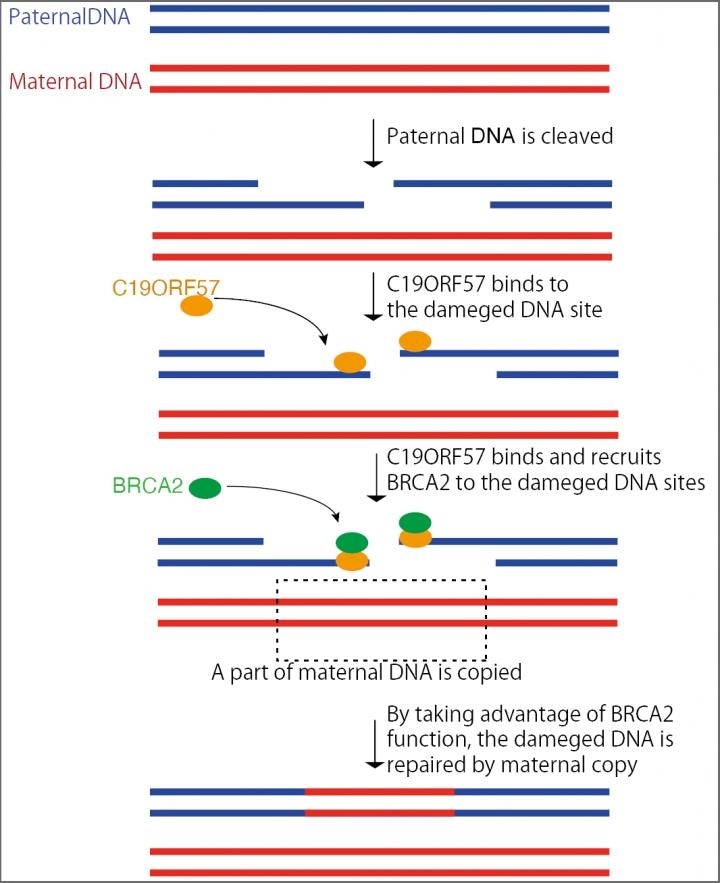The gene C19ORF57 has been identified to play a major role in meiosis. This discovery was made by a team of scientists from the Institute of Molecular Embryology and Genetics (IMEG) at Kumamoto University in Japan.

Normally, DNA breaks are introduced at the beginning of meiotic recombination. However, such DNA breaks are a threat to a cell and must be repaired immediately. The newly identified C19ORF57 gene mediates binding of BRCA2 to damaged DNA sites for repair. Image Credit: Dr Kei-ichiro Ishiguro.
The C19ORF57 gene seems to be associated with the cause of male infertility and may represent a major advancement for reproductive medicine.
Meiosis is a unique type of cell division that produces eggs or sperm. During this process, genetic data is exchanged between paternal and maternal chromosomes via meiotic recombination. Through this process, genetic differences are introduced to the next generation.
Meiotic recombination is generally triggered by introducing breaks in the DNA. But this process damages the DNA that can pose a danger to the cell. Even though it is a regular and essential process to introduce DNA breaks to initiate meiotic recombination, these breaks should be repaired instantly.
A unique gene, discovered by Dr. Ishiguro and Dr. Takemoto in this research, plays a significant role in repairing the DNA damage during meiotic recombination. The same group of researchers had earlier identified the Meiosin gene that functions as a switch to trigger meiosis and also scores of other genes in the process. But the functions of all the other genes are yet to be fully explained.
The C19ORF57 gene is one of those regulated by MEIOSIN and its role was not clear until now.
The scientists embarked to explain the function of the C19ORF57 gene in meiosis. By using mass spectrometry, the team observed that this gene attaches to breast cancer suppressor BRCA2—a type of protein that is involved in repairing damaged DNA. This information implies that BRCA2 and C19ORF57 work together in germ cells.
Additional evidence demonstrating the cooperation between BRCA2 and C19ORF57 was discovered through microscopic imaging. The scientists identified that the C19ORF57 gene goes first to the sites of damaged DNA and subsequently recruits the BRCA2 protein to the same position on the chromosomes.
With the help of genome editing technology to artificially block the C19ORF57 gene in mice, the scientists were able to observe that the male animals became infertile because of incomplete meiotic recombination and lack of sperm production. Additional analysis of male gonads showed that the gene plays a significant role in repairing damaged DNA.
There are several unidentified causes of human male infertility, and this discovery may reveal a unique pathology. While these experiments were carried out on animal models, the C19ORF57 gene is also present in humans. Diagnostics and therapies developed from this study could ensure the quality of meiosis and reduce the instances of difficulties.
Source:
Journal reference:
Takemoto, K., et al. (2020) Meiosis-Specific C19orf57/4930432K21Rik/BRME1 Modulates Localization of RAD51 and DMC1 to DSBs in Mouse Meiotic Recombination. Cell Reports. doi.org/10.1016/j.celrep.2020.107686.